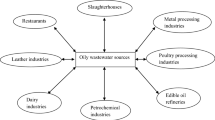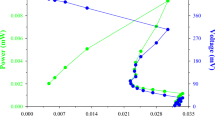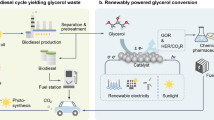Abstract
Substituted benzothiophenes (BTs) and dibenzothiophenes (DBTs) remain in diesel oil following conventional desulfurization by hydrodesulfurization. A mixture of washed cells (13.6 g dry cell wt l−1) of Rhodococcus erythropolis DS-3 and Gordonia sp. C-6 were employed to desulfurize hydrodesulfurized diesel oil; its sulfur content was reduced from 1.26 g l−1 to 180 mg l−1, approx 86% (w/w) of the total sulfur was removed from diesel oil after three cycles of biodesulfurization. The average desulfurization rate was 0.22 mg sulfur (g dry cell wt)−1 h−1. A bacterial mixture is therefore efficient for the practical biodesulfurization of diesel oil.


Similar content being viewed by others
References
Denome SA, Olson ES, Young KD (1993) Identification and cloning of genes involved in specific desulfurization of dibenzothiophene by Rhodococcus sp. strain IGTS8. Appl Environ Microbiol 59(9):2837–2843
Gilbert SC, Morton J, Buchanan S, Oldfield C, McRoberts A (1998) Isolation of a unique benzothiophene-desulphurizing bacterium, Gordona sp. strain 213E (NCIMB 40816), and characterization of the desulphurization pathway. Microbiology 144(9):2545–2553
Grossman MJ, Lee MK, Prince RC, Minak-Bernero V, George GN, Pickering IJ (2001) Deep desulfurization of extensively hydrodesulfurized middle distillate oil by Rhodococcus sp. strain ECRD-1. Appl Environ Microbiol 67(4):1949–1952
Gunam IB, Yaku Y, Hirano M, Yamamura K, Tomita F, Sone T, Asano K (2006) Biodesulfurization of alkylated forms of dibenzothiophene and benzothiophene by Sphingomonas subarctica T7b. J Biosci Bioeng 101(4):322–327
Gupta N, Roychoudhury PK, Deb JK (2005) Biotechnology of desulfurization of diesel: prospects and challenges. Appl Microbiol Biotechnol 66:356–366
Ishii Y, Kozaki S, Furuya T, Kino K, Kirimura K (2005) Thermophilic biodesulfurization of various heterocyclic sulfur compounds and crude straight-run light gas oil fraction by a newly isolated strain Mycobacterium phlei WU-0103. Curr Microbiol 50(2):63–70
Kilbane JJ II (2006) Microbial biocatalyst developments to upgrade fossil fuels. Curr Opin Biotechnol 17(3):305–314
Kobayashi M, Onaka T, Ishii Y, Konishi J, Takaki M, Okada H, Ohta Y, Koizumi K, Suzuki M (2000) Desulfurization of alkylated forms of both dibenzothiophene and benzothiophene by a single bacterial strain. FEMS Microbiol Lett 187(2):123–126
Konishi J, Onaka T, Ishii Y, Suzuki M (2000) Demonstration of the carbon sulfur bond targeted desulfurization of benzothiophene by thermophilic Paenibacillus sp. Strain A11-2 capable of desulfurizing dibenzothiophene. FEMS Microbiol Lett 187:151–154
Li FL, Xu P, Ma CQ, Luo LL, Wang XS (2003) Deep desulfurization of hydrodesulfurization-treated diesel oil by a facultative thermophilic bacterium Mycobacterium sp. X7B. FEMS Microbiol Lett 142:65–70
Li GQ, Lee K, Ma T, Li SS, Li H, Liang FL, Liu RL (2006) Isolation and characterization of a benzothiophene-desulfurizing bacterium. Huan Jing Ke Xue 27(6):1181–1185
Li GQ, Ma T, Li SS, Li H, Liang FL, Liu RL (2007) Improvement of dibenzothiophene desulfurization activity by removing the gene overlap in the dsz operon. Biosci Biotechnol Biochem 71(4):849–854
Li GQ, Li SS, Zhang ML, Wang J, Zhu L, Liang FL, Liu RL, Ma T (2008) Genetic rearrangement strategy for optimizing the dibenzothiophene biodesulfurization pathway in Rhodococcus erythropolis. Appl Environ Microbiol 74(4):971–976
Ma T, Li J, Tong MY, Zhang XP, Liu RL (2002) Desulfurization of dibenthiophene by Rhodococcus sp. DS-3. Acta Microbiologica Sinica 42:126–131
Piddington CS, Kovacevich BR, Rambosek J (1995) Sequencing and molecular characterization of a DNA region encoding the dibenzothiophene-desulfurization operon of Rhodococcus sp.IGTS8. Appl Environ Microbiol 61(2):468–475
Tanaka Y, Matsui T, Konishi J, Maruhashi K, Kurane R (2002) Biodesulfurization of benzothiophene and dibenzothiophene by a newly isolated Rhodococcus strain. Appl Microbiol Biotechnol 59:325–328
Yu B, Xu P, Shi Q, Ma C (2006) Deep desulfurization of diesel oil and crude oils by a newly isolated Rhodococcus erythropolis strain. Appl Environ Microbiol 72(1):54–58
Zhang Q, Tong MY, Li YS, Gao HJ, Fang XC (2007) Extensive desulfurization of diesel by Rhodococcus erythropolis. Biotechnol Lett 29(1):123–127
Acknowledgments
This work was supported by China Postdoctoral Science Foundation (No. 20060400689) and National Natural Science Foundation of China (No. 50674058).
Author information
Authors and Affiliations
Corresponding author
Rights and permissions
About this article
Cite this article
Li, GQ., Li, SS., Qu, SW. et al. Improved biodesulfurization of hydrodesulfurized diesel oil using Rhodococcus erythropolis and Gordonia sp.. Biotechnol Lett 30, 1759–1764 (2008). https://doi.org/10.1007/s10529-008-9748-8
Received:
Revised:
Accepted:
Published:
Issue Date:
DOI: https://doi.org/10.1007/s10529-008-9748-8




